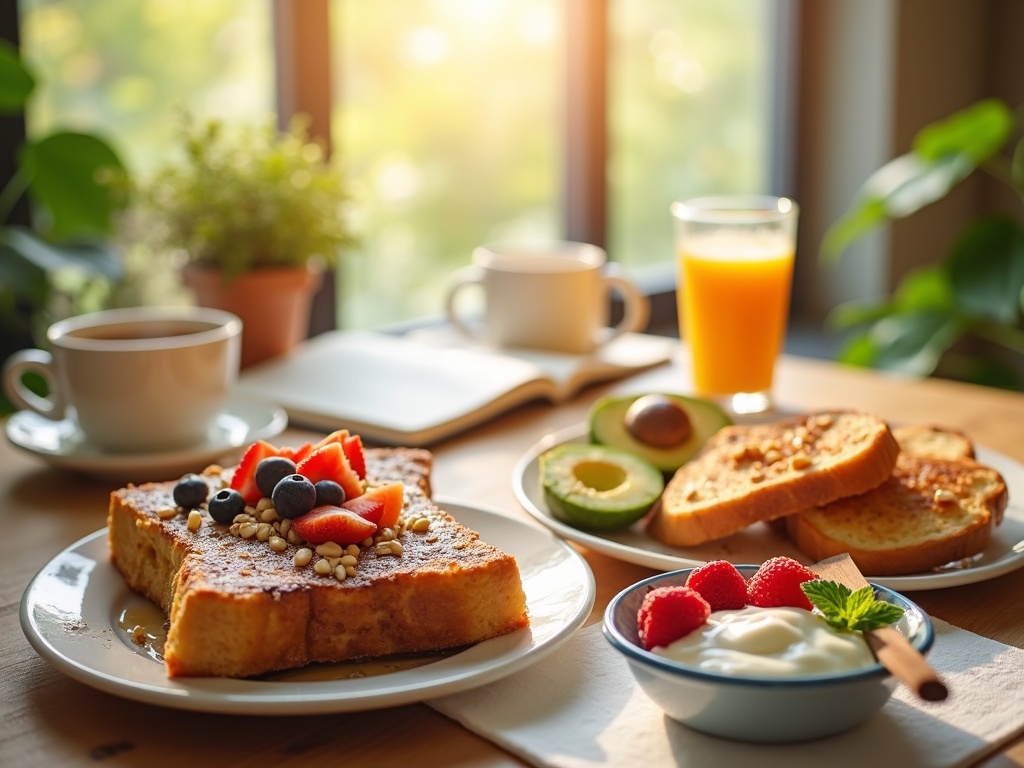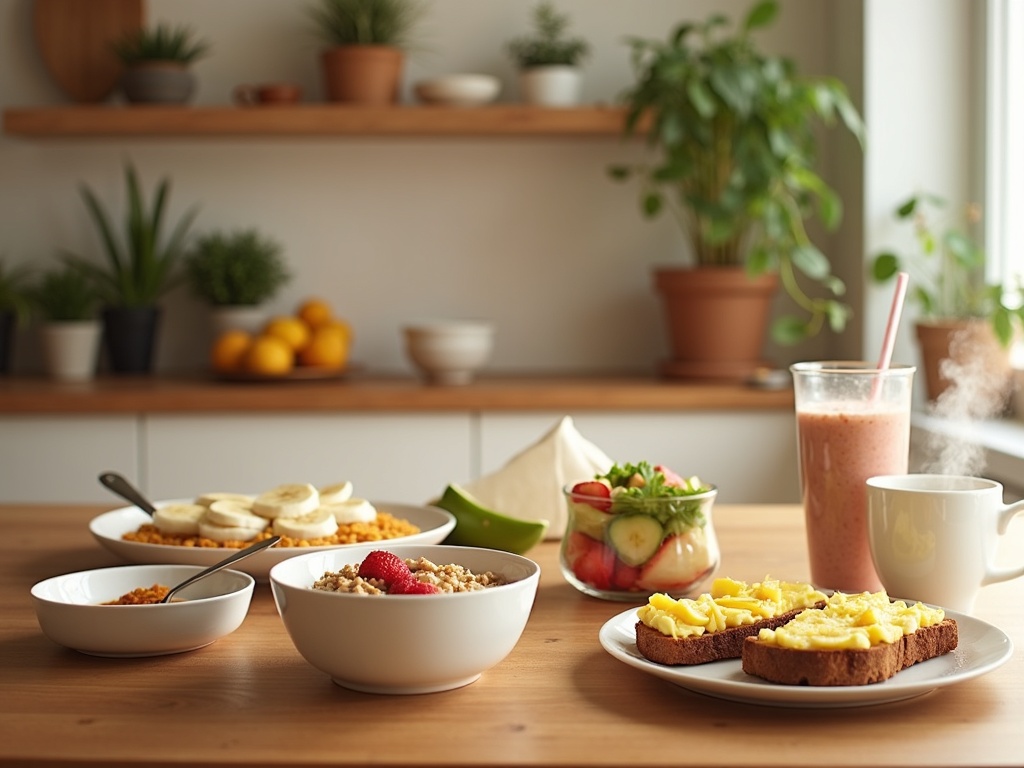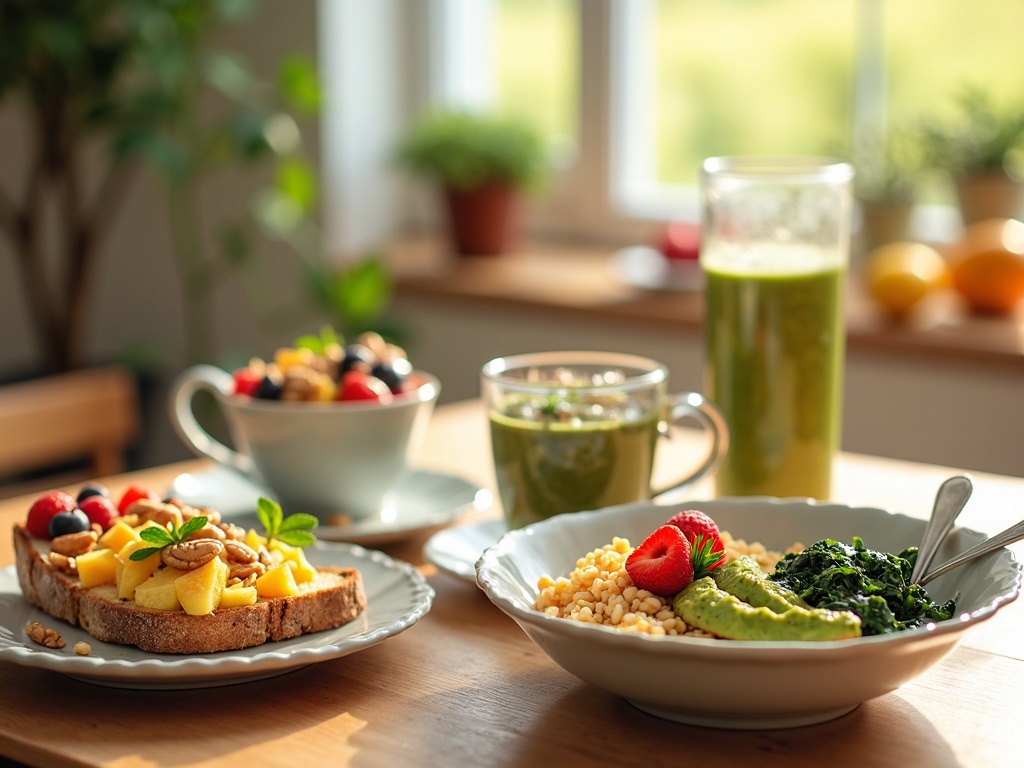Starting your day with a nutritious breakfast doesn’t have to be time-consuming or expensive. Research shows it provides crucial health benefits that impact everything from heart health to cognitive function. Simple ingredients like eggs, oats, and fresh fruits can create satisfying morning meals for just $2-3 per serving while delivering sustained energy and better concentration throughout your day.
Find In This Article
Key Takeaways
- Regular breakfast consumption is linked to a 27% lower risk of coronary heart disease and better weight management compared to breakfast skipping.
- Meal prepping strategies like overnight oats and freezer smoothie packs can save up to 1.5 hours of morning preparation time each week.
- Homemade breakfast typically costs 50-70% less than cafe options, with simple meals averaging $1-2 per serving.
- Including 15-20g of protein from sources like eggs or Greek yogurt helps control appetite and stabilize blood sugar levels.
- Incorporating fruits and vegetables into breakfast helps meet daily nutritional requirements while adding flavor and nutrients to common breakfast foods.
Why Breakfast Really Matters
Starting your day with a good breakfast might seem optional, but research shows it’s a crucial habit for your overall health. Despite the clear benefits, about 26% of people regularly skip their morning meal. I’ve found that incorporating breakfast into my daily routine has made a significant difference in how I function throughout the day.
Health Benefits You Can’t Ignore
The science behind breakfast’s importance is compelling. Research has shown that people who skip breakfast face a 27% higher risk of coronary heart disease compared to those who eat it regularly. This statistic alone should make us reconsider the “no time for breakfast” excuse. Beyond heart health, studies consistently link regular breakfast consumption with better weight management. When I started eating healthy breakfast options daily, I noticed I was less likely to overeat at lunch or dinner.
Breakfast directly impacts your cognitive function too. After the overnight fast, your brain needs fuel to perform optimally. Studies show that children and adults who eat breakfast display better concentration, memory, and problem-solving abilities throughout the morning. I’ve noticed sharper focus and improved productivity during my morning work sessions since making breakfast non-negotiable.
Your energy levels get a significant boost from breakfast as well. Breaking your overnight fast jumpstarts your metabolism and replenishes glucose supplies, which translates to sustained energy. Without this morning refueling, many people experience mid-morning energy crashes that can derail productivity.
One of the most noticeable benefits I’ve experienced is reduced hunger throughout the day. When you eat a balanced morning meal with protein and fiber from breakfast foods like eggs, whole grains, or Greek yogurt, your body maintains more stable blood sugar levels. This translates to fewer hunger pangs and less likelihood of reaching for unhealthy snacks before lunch.
For those trying to manage their weight, breakfast can be particularly valuable. Research published in the Journal of Nutrition found that breakfast eaters tend to consume fewer calories throughout the day compared to breakfast skippers. I’ve found that starting with a best breakfast for weight loss that includes protein and fiber helps control my appetite and food choices for hours afterward.
Whether you prefer something quick like savory oatmeal or something more traditional like French toast, finding breakfast options you enjoy is key to making this healthy habit stick. The evidence is clear – breakfast isn’t just another meal, it’s a foundational health practice with benefits that last all day.

Quick and Budget-Friendly Morning Meals
Starting your day with a satisfying breakfast doesn’t have to drain your wallet. I’ve discovered that creating delicious breakfast meals at home typically costs just $2-3 per serving—a fraction of what you’d spend at cafes.
Cost Breakdown of Breakfast Staples
The economics of home cooking become clear when you break down individual ingredients. A single egg costs about $0.16, making a two-egg breakfast base incredibly affordable. Fresh bananas average around $0.25 each, providing natural sweetness and nutrients at minimal cost. For those cold mornings, a hearty serving of oatmeal runs about $0.10 per portion—perhaps the most budget-friendly breakfast foundation available.
These simple ingredients form the backbone of countless breakfast foods that keep both your body and bank account happy. The savings become even more apparent when comparing home-cooked options to their cafe counterparts.
When I make breakfast at home instead of visiting local cafes, I save between 50-70% on each meal. A typical breakfast sandwich at a coffee shop costs $5-7, while I can prepare the same sandwich at home for approximately $2. Over a month, this small daily decision can save well over $100.
Affordable Ingredient Combinations
I’ve found several ingredient pairings that create satisfying, nutritious healthy breakfast options without breaking the bank:
- Oatmeal variations: Basic oats topped with sliced banana and a spoonful of peanut butter costs around $0.75 per serving. For a savory oatmeal twist, add a fried egg and dash of soy sauce for under $1.
- Egg-based meals: Two scrambled eggs with toast and a piece of fruit comes to about $1.50. Make it a burrito with a tortilla and leftover vegetables for $2.
- Toast toppers: Whole grain toast with mashed avocado and a sprinkle of salt costs around $1.25. Swap avocado for peanut butter and banana slices to lower the cost to under $1.
- Yogurt parfaits: Plain yogurt layered with seasonal fruit and a drizzle of honey averages $1.75 per serving.
- Breakfast smoothies: Frozen banana, milk, and a tablespoon of cocoa powder creates a filling drink for about $1.25.
These combinations aren’t just budget-friendly—they’re also quick to prepare, making them perfect for busy mornings when time feels as precious as money.
The beauty of budget breakfast cooking comes from its simplicity. You don’t need fancy equipment or rare ingredients to create meals that satisfy hunger and provide energy for the day ahead. Many best breakfast for weight loss options are actually among the most affordable.
Even indulgent breakfasts like French toast can be budget-friendly. Using day-old bread (which you might otherwise discard), two eggs, a splash of milk, and a dusting of cinnamon creates a breakfast that feels luxurious for under $1.50 per serving.
By keeping a small rotation of versatile ingredients on hand—eggs, oats, bananas, bread, milk, and seasonal fruits—I create different breakfast combinations throughout the week without feeling like I’m compromising on taste or nutrition. The financial benefit simply becomes a welcome bonus to starting my day with a satisfying, home-cooked meal.

Save Time with Smart Prep Strategies
I’ve discovered that breakfast meal prep isn’t just convenient—it’s a game-changer for busy mornings. When implemented effectively, meal prepping can slash cooking time by 50%, giving you precious extra minutes to start your day right.
Overnight Oats: The Ultimate Make-Ahead Breakfast
Overnight oats have revolutionized my morning routine. This healthy breakfast option requires zero morning cooking time while delivering maximum nutrition.
To make basic overnight oats:
- Combine ½ cup rolled oats with ½ cup milk of your choice in a jar
- Add 2 tablespoons yogurt for creaminess and protein
- Mix in 1 teaspoon of honey or maple syrup for sweetness
- Top with your favorite fruits like berries or banana slices
- Sprinkle with nuts or seeds for extra crunch
- Seal and refrigerate overnight
The magic happens while you sleep—the oats soften and absorb the flavors, creating a delicious ready-to-eat breakfast. I make five jars on Sunday evening and have breakfast sorted for the entire workweek.
Freezer Smoothie Packs for Instant Breakfasts
Smoothies are perfect for rushed mornings, but measuring and chopping ingredients takes valuable time. Freezer smoothie packs solve this problem brilliantly.
Creating effective smoothie packs is simple:
- Portion fruits and veggies into individual freezer bags or containers
- Add any dry ingredients like chia seeds or protein powder in a separate compartment
- Label each pack with contents and date
- In the morning, dump the contents into your blender, add liquid, and blend
My favorite combination includes banana, spinach, berries, and a dash of cinnamon. These packs stay fresh for up to three months in the freezer, making them perfect for breakfast planning.
For added nutrition, consider preparing savory options too. Savory oatmeal bases can be prepped ahead and customized with toppings like avocado or eggs in the morning.
Batch cooking extends beyond oats and smoothies. French toast can be made in large quantities and frozen. Simply pop slices in the toaster for a quick French toast breakfast that tastes freshly made.
The impact on morning efficiency is remarkable. Rather than spending 15-20 minutes cooking, I now invest just 30-60 minutes on Sunday to prepare breakfasts for the entire week. This strategic approach gives me back nearly 1.5 hours weekly—time I can spend exercising, meditating, or simply enjoying a more relaxed start to my day.
Proper storage is crucial for successful meal prepping. Glass containers maintain freshness better than plastic and don’t absorb odors. For items like breakfast foods that will be frozen, ensure containers are freezer-safe and leave room for expansion.
I’ve found that implementing these smart prep strategies has transformed my relationship with morning meals. No more skipping breakfast or grabbing unhealthy options on the go. Now I enjoy nutritious, delicious breakfasts every day with minimal morning effort.
For those focused on health goals, meal prepping makes it easier to control portions and ingredients, which is particularly helpful when looking for the best breakfast for weight loss.
By investing a little time upfront, I’ve created a sustainable breakfast routine that saves time, reduces stress, and supports better eating habits—proving that with smart prep strategies, easy breakfast is always within reach.
Power-Packed Ingredients for Your Morning
Starting my day with the right ingredients makes all the difference in my energy levels and overall health. I’ve discovered that focusing on nutrient-dense foods rather than quick, sugary options creates a foundation for better productivity and wellness throughout the day.
Nutrient-Rich Morning Essentials
The American Heart Association recommends consuming 4-5 servings of fruits and vegetables daily, yet surprisingly, only 13% of Americans actually meet these guidelines. I find breakfast is the perfect opportunity to start closing this gap. Adding berries to yogurt, spinach to omelets, or avocado to whole grain toast instantly boosts the nutritional value of my breakfast without much extra effort.
When comparing breakfast options, the difference between whole grain and sugary cereals is striking. Whole grain cereals typically contain 3-5 grams of fiber per serving compared to less than 1 gram in many sugary alternatives. They also provide essential B vitamins, iron, and magnesium that support sustained energy release. I’ve noticed that switching to healthy breakfast options with whole grains keeps me fuller longer and prevents that mid-morning energy crash.
For optimal morning fuel, I focus on including:
- Complex carbohydrates (oats, whole grain bread, quinoa)
- Healthy fats (avocados, nuts, seeds)
- Fiber-rich fruits (berries, apples, pears)
- Vegetables (spinach, bell peppers, tomatoes)
- Quality protein sources
These nutrients work together to stabilize blood sugar, support cognitive function, and provide steady energy throughout the morning hours.
Protein Powerhouses for Breakfast
Adding adequate protein to my breakfast foods has been game-changing for my morning routine. The best protein sources for breakfast include:
- Eggs (with approximately 6g protein per egg)
- Greek yogurt (15-20g per cup)
- Cottage cheese (24g per cup)
- Plant-based options like tofu scrambles (8-10g per serving)
I’ve found that breakfast for weight loss works best when I include at least 15-20g of protein, which helps control appetite throughout the morning. For example, a simple savory oatmeal topped with an egg and vegetables can provide nearly 15g of protein while offering complex carbs and fiber.
Even indulgent breakfast options can be made more nutritious. When making French toast, I use whole grain bread, add cinnamon for blood sugar regulation, and top with fresh fruit instead of syrup for added nutrients without excess sugar.
By being intentional about including these power-packed ingredients in my morning meals, I’ve transformed breakfast from a hasty afterthought into a strategic nutritional opportunity that fuels my day right from the start.
Creative Breakfast Combinations
Starting my day with a satisfying breakfast sets the tone for everything that follows. I’ve discovered that mixing fruits, vegetables, and proteins creates balanced morning meals that keep me energized until lunch. These combinations don’t require culinary expertise—just a willingness to experiment with flavors and textures.
Fruit and Veggie Power Pairings
Smoothies offer one of the easiest ways to incorporate both fruits and vegetables into breakfast. I regularly blend a handful of spinach with banana, berries, and a splash of almond milk for a nutrient-packed drink that tastes primarily of fruit. The mild flavor of spinach disappears behind the sweetness, making this an excellent option for vegetable-averse family members.
For those mornings when I need something more substantial, I turn to healthy breakfast options like whole grain pancakes with creative toppings. Instead of drowning them in syrup, I’ve found these alternatives elevate plain pancakes:
- Sliced bananas with a drizzle of almond butter and cinnamon
- Greek yogurt with mixed berries and a light honey drizzle
- Diced apples sautéed with cinnamon and a sprinkle of chopped walnuts
- Ricotta cheese mixed with lemon zest and topped with blueberries
Egg-based dishes present endless possibilities for incorporating vegetables. I prepare egg muffins on Sundays for an easy grab-and-go breakfast throughout the week. Simply whisk eggs with salt and pepper, fold in chopped vegetables like bell peppers, spinach, and cherry tomatoes, then bake in a muffin tin until set. These protein-rich bites stay fresh in the refrigerator for days.
Savory oatmeal has become my unexpected favorite. I cook rolled oats with vegetable broth instead of water, then top with sautéed mushrooms, wilted spinach, and a soft-boiled egg. A sprinkle of everything bagel seasoning adds the perfect finishing touch.
For a sweet-meets-savory option, French toast made with whole grain bread provides the perfect canvas. I top mine with a mixture of ricotta cheese, cinnamon, and diced pears for a breakfast that feels indulgent but offers balanced nutrition.
The key to maintaining interest in breakfast foods lies in rotation. I plan my weekly ingredients around different food groups:
- Monday: Berry focus (strawberries, blueberries in yogurt or oatmeal)
- Tuesday: Tropical fruits (mango, pineapple in smoothies)
- Wednesday: Green vegetables (spinach, kale incorporated into eggs)
- Thursday: Root vegetables (sweet potatoes, carrots in breakfast hash)
- Friday: Stone fruits (peaches, plums as toppings)
This rotation prevents breakfast boredom while ensuring I receive diverse nutrients throughout the week.
For those trying to manage their weight, these creative combinations can help. The fiber from fruits and vegetables paired with protein creates meals that satisfy hunger longer than carbohydrate-heavy options alone. Best breakfast for weight loss options often include this balanced approach to morning eating.
I’ve found that prepping components ahead of time—washing and chopping fruits and vegetables, hard-boiling eggs, or preparing overnight oats—removes morning decision fatigue. With ingredients ready to go, I’m more likely to assemble something nutritious rather than reaching for processed alternatives.
Even small changes can transform standard breakfast fare. Adding grated zucchini to oatmeal, incorporating shredded carrots into morning muffins, or blending cauliflower into smoothies boosts nutrition without sacrificing flavor. These subtle additions often go undetected while providing valuable nutrients to start the day.
Sources:
“Eating Breakfast and Health: A Conversation with Dr. Stephen G. Post”
“Skipping Breakfast Linked to Higher Heart Disease Risk” – Circulation Journal
“American Heart Association Recommendations on Nutrition”
USDA Nutritional Guidelines
Food Cost Survey – USDA

